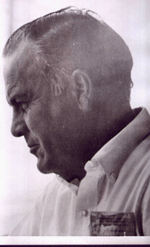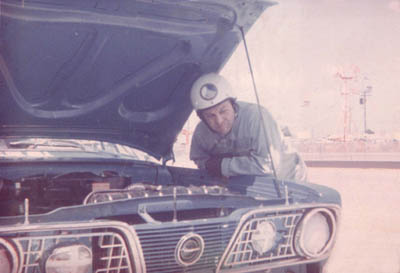 From Charlie Rainville's obituary by Ken Parker from the Providence
Journal Bulletin , February 10, 1985, this says it all;
From Charlie Rainville's obituary by Ken Parker from the Providence
Journal Bulletin , February 10, 1985, this says it all;" No man
is irreplaceable, but one cannot help but feel a twinge of sympathy
for the person who steps into Charlie Rainville's shoes. Motorsports
people are mourning the loss of Rainville, who died a week ago
today.
During his many years as racing director of the International Motor
Sports Association (IMSA), Charlie was known, loved and respected
nationwide, not only for his competence, but also for his fairness
and quiet generosity.
John Bishop, president of IMSA, gives Charlie much of the credit for
making IMSA the world's foremost professional road racing
organization. And Charlie raised IMSA to that level in less than 10
years.
When Charlie was racing in the '50s and '60s, he often helped
competitions prepare their cars, often lending or giving parts - and
then going out and beating them.
Later, as an official, his seemingly conspiratorial grin was often
compensation for a driver who lost a negative Rainville decision.
After a brief fling in stock cars and Midgets after his World War II
stint in the Navy, he became one of the pioneers of sports car
racing. Charlie never seemed to have come up from the ranks. He
started right out in the majors, driving Alfas and Jaguars, not only
for himself in Sports Car Club of America (SCCA) national
competition, but also with Rhode Island auto dealer Jake Kaplan
in the challenging Sebring 12 Hour Grand Prix.
Charlie not only drove to victories and championships; he built his
own race cars and engines. And he was always his own pit crew at the
track. Besides his mechanical skill, he was an artist with the
delicate aluminum bodies of Jags.. Porsches Ferraris, and other
exotic cars. Those on the fringe of motor sports remember him, too,
for starting the Narragansett Sports Car Club, the state's first, in
the early 1950s. An instant expert at both rallies and speed events,
he conducted the club's time trials on Memorial Boulevard, Newport,
for several seasons.
 During
one 12-hour overnight rally in that period, Charlie raced around the
Rhode Island and Connecticut countryside ahead of competitors from
midnight to dawn correcting a series of errors the organizers had
made in directions. During
one 12-hour overnight rally in that period, Charlie raced around the
Rhode Island and Connecticut countryside ahead of competitors from
midnight to dawn correcting a series of errors the organizers had
made in directions.
Even those who were only customers of his service work, both at
Kaplan's and later in his own shop, recall Rainville fondly. He
usually remembered what needed to be done better than the car owner
did.
Those who knew Rainville only through his skill with cars, knew only
part of the man. He was an antiques fancier, particularly of
glassware, and a skilled cabinetmaker, building and upholstering
some of his own furniture.
Besides all this, Charlie was a gourmet cook. Always a gracious host
at his Scituate home, he was disappointed if guests could not stay
for dinner.
If someone asked him how come he knew how to do all these things,
he'd reply in his
quiet, rapid-fire way, "A good man can do anything
he puts his mind to." The corners of his mouth would rise just a
little and his eyes would twinkle so you'd know he was half kidding
- but only half.
Being resilient, Charlie had coped well since his wife Sandy died
about a year ago. People close to him can't help wondering, though,
if loneliness and a sense that his work was completed were perhaps
as fatal as his coronary.
Kaplan recalls of Charlie, "We grew up together. He raced with me
and worked with me. When he was our service manager, I couldn't
measure his value. I lost a damn good friend. What else can I say?"
Kaplan says just about the only thing many of us can say.
|

 From Charlie Rainville's obituary by Ken Parker from the Providence
Journal Bulletin , February 10, 1985, this says it all;
From Charlie Rainville's obituary by Ken Parker from the Providence
Journal Bulletin , February 10, 1985, this says it all; During
one 12-hour overnight rally in that period, Charlie raced around the
Rhode Island and Connecticut countryside ahead of competitors from
midnight to dawn correcting a series of errors the organizers had
made in directions.
During
one 12-hour overnight rally in that period, Charlie raced around the
Rhode Island and Connecticut countryside ahead of competitors from
midnight to dawn correcting a series of errors the organizers had
made in directions.